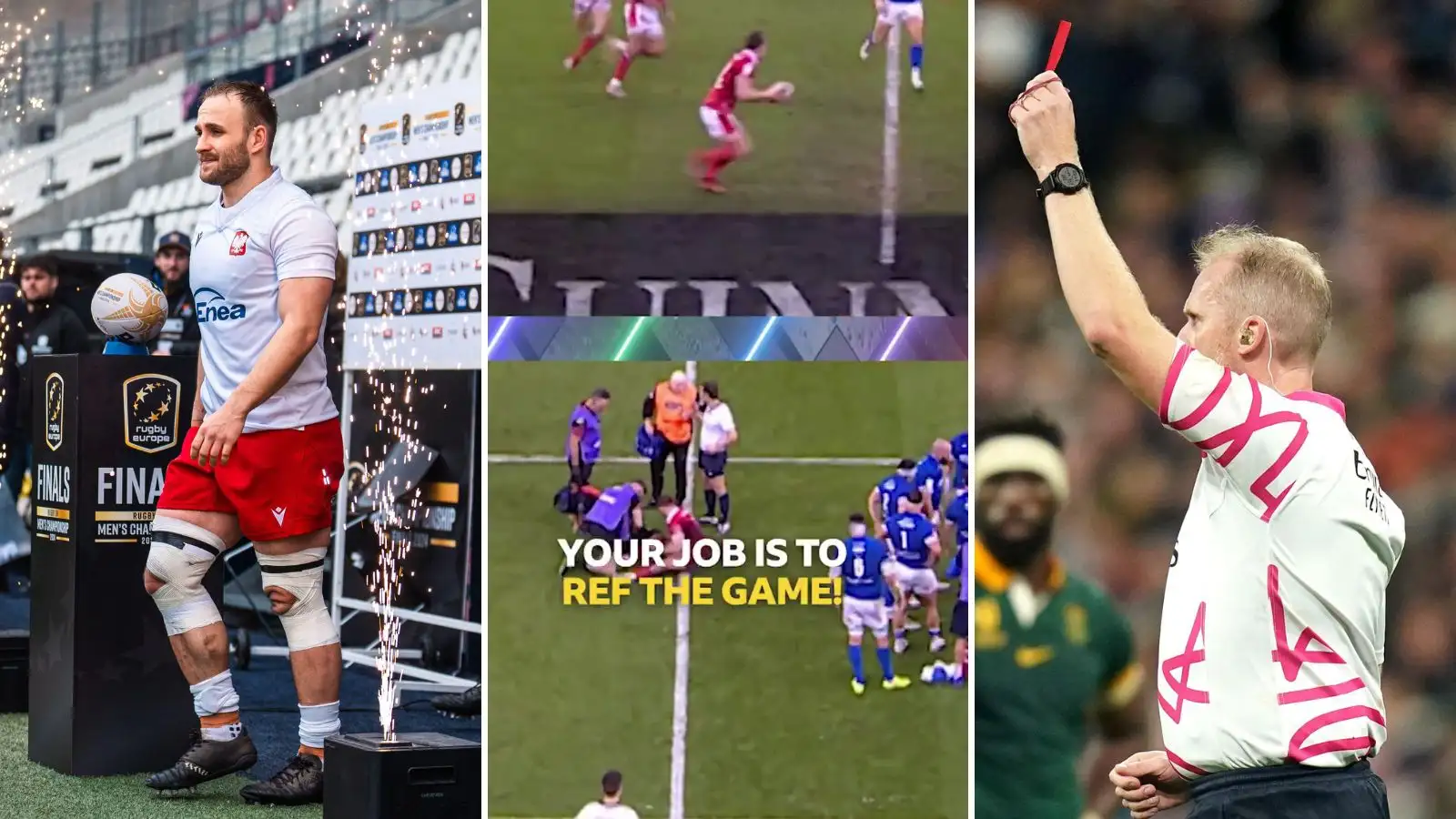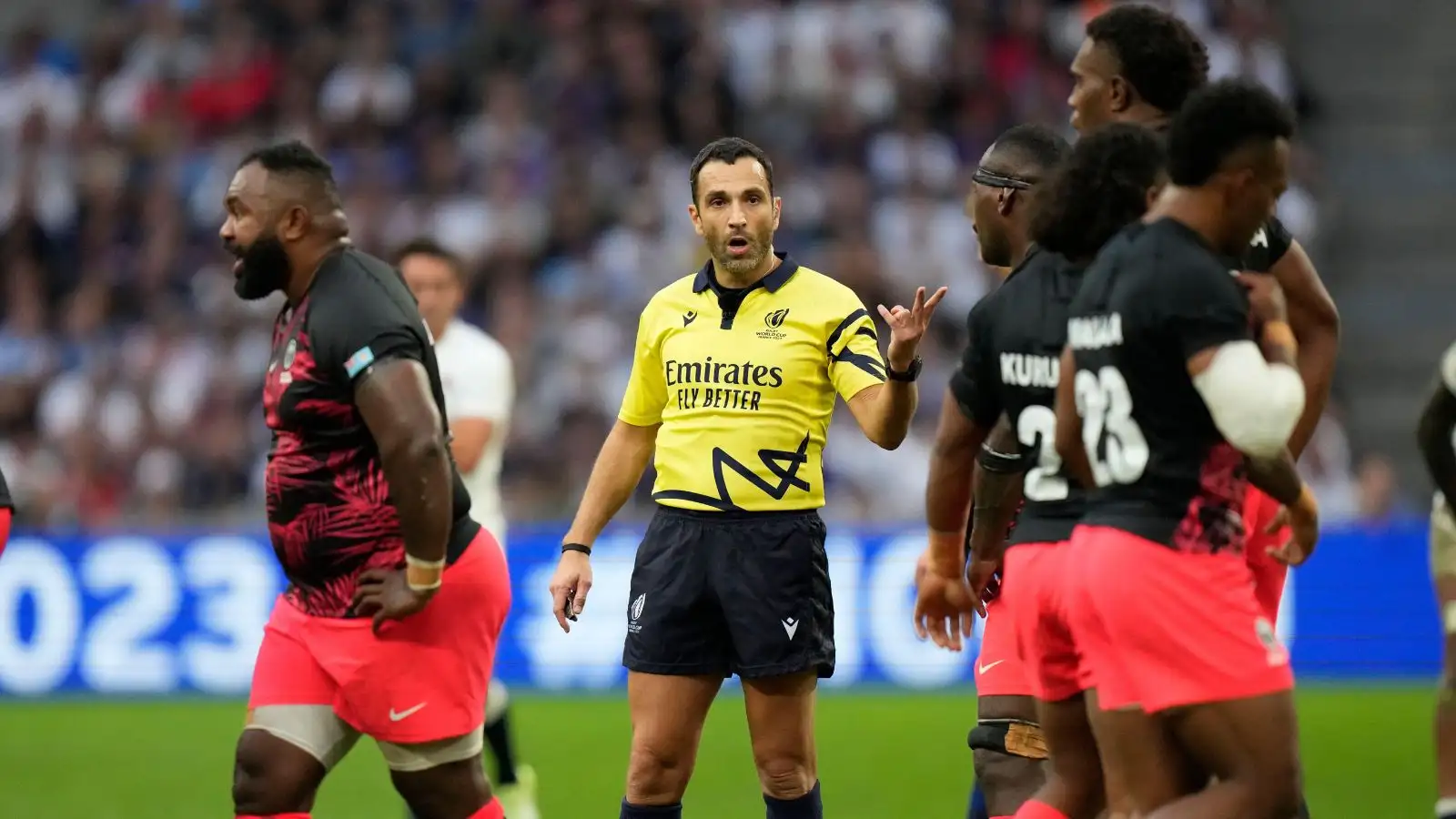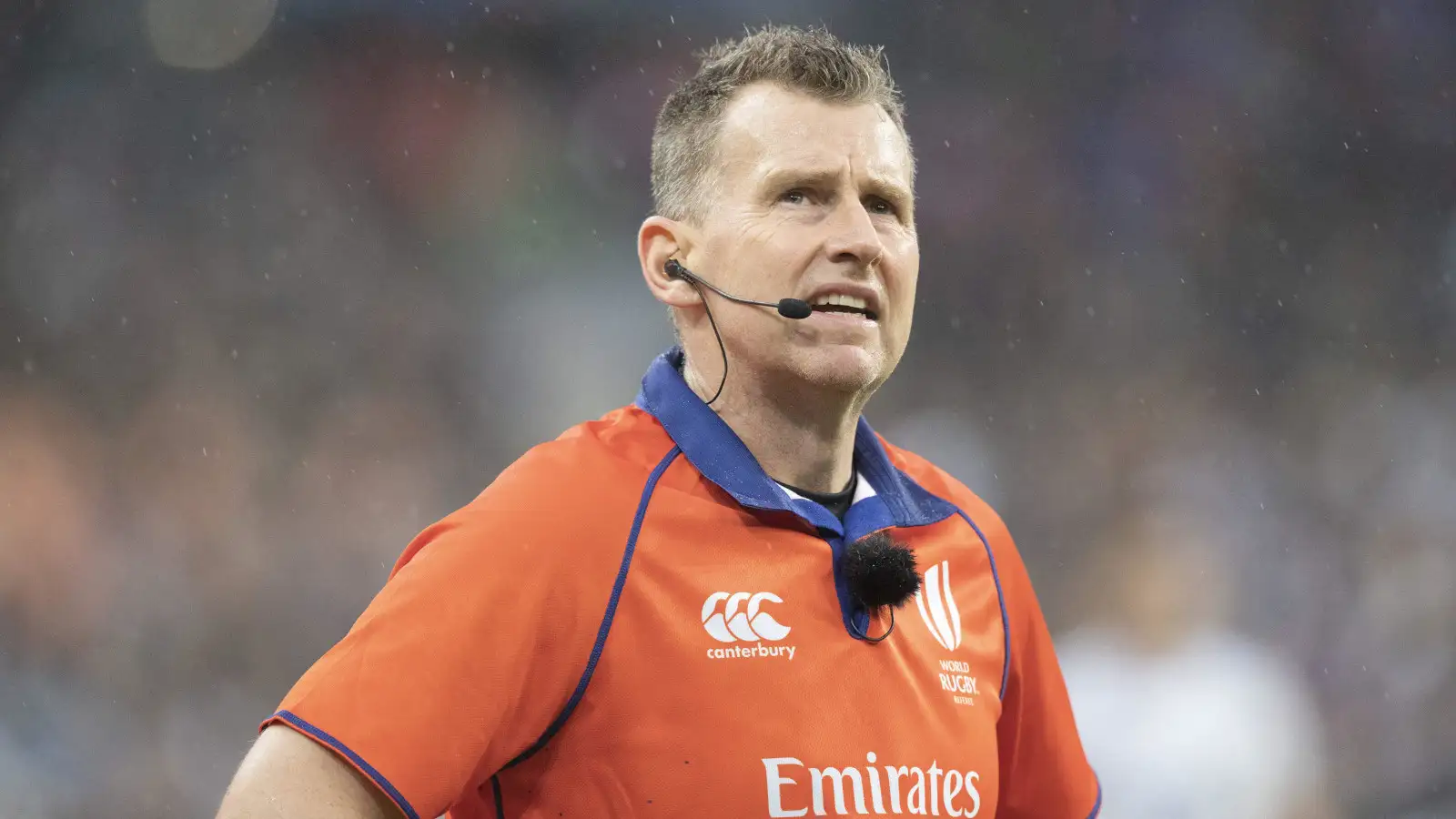Loose Pass: Rugby Europe ‘frustrations’, referees ‘need space’ and binning 20-minute red cards

Belgium and Poland players entering the field during the Rugby Europe Championship 2024 Finals, Neil Jenkins and Matthieu Raynal clash and Wayne Barnes.
This week, we will mostly be concerning ourselves with the second tier, leaving the referee alone and card consequences…
A long day in Paris
At first glance, it seemed a good idea from Rugby Europe, popping all four ranking playoff matches on one day in one location: Sunday at the Stade Jean Bouin in Paris. If local crowds and venues in some locations through the tournament have not been overwhelming, the opportunity to snag one, or even three, matches on top of watching your own team in a snazzy venue appeared to be a golden opportunity for the tier two nation rugby buff to have a good weekend away.
So the sight of vast swathes of empty seats that greeted the Rugby Europe Championship placing deciders on Sunday was a disappointment, not least because the championship itself has been pretty good at times.
The games were rarely disappointing either, barring the one-sided nature of Belgium’s win over Poland and Holland’s nilling of Germany. Spain’s attacking nous was a delight at times, as was Romania’s late discovery that they were significantly fitter than their Spanish opponents – had the Oaks managed to snaffle a converted try with the final phase of the game, you’d have been a brave man to bet against them in extra-time.
The final – for which the stadium filled up significantly – was marked by several aspects on top of it being a replay of the thrilling drawn World Cup pool match in Toulouse last year. Even on the day before, with the eight competing teams allocated timeslots for their respective captain’s runs in the stadium, the tension had cranked up, with Portugal apparently running over time and causing a standoff with their counterparts.
It was not the only delay to proceedings either, with the Georgian bus on matchday getting caught in traffic and delaying the kick-off by 15 minutes. Coach Richard Cockerill apparently was too frustrated to give a pre-match interview, while the tension on the pitch was released by both teams in a frantic first half, which one match commentator likened to watching a hundred puppies in a field.
If ever there was a spiritual home for a former member of the Leicester Tigers ABC club, it is as coach Georgia. The Lelos have added plenty of finesse to their team over the years, but their win was founded on a scrum that pulverised the opposition. Portugal tried their best to stop it, but referee Tual Trainini, already cognisant and unrelenting in dealing with shenanigans at scrum time when he yellow-carded a prop from each team for failing to hold yet another scrum upright early in the game, threatened to card Portugal at scrum time again later in the match. The Portuguese prop acknowledged his warning with a flap of the arms and open hands, very much as if to say: “Card me? All I am doing is being beaten!”
It wasn’t just scrums though; Georgia dominated in almost every facet of contact, tackling harder, jackaling faster, driving further in tackles, winning kick-chases and rucking more cleanly. Portugal’s skills tried to come through, but were simply slapped down. And when the opportunities came, boy can the Georgian outside backs move fast.
A fun day of rugby, watched by too few people. But the concept is good: if Rugby Europe can find a proper niche on the calendar where the Six Nations is not a distraction, it has tremendous potential.
Jenkins exchange symptomatic
The exchange between Neil Jenkins and Matheu Raynal during Wales’ defeat to Italy was a new low point in on-pitch verbals with the referee – Jenkins was fully in the wrong, but Raynal’s condescending response of ‘your job is to bring on water’ was unedifying – which continues to become more and more prevalent.
The biggest problem – for all concerned – however, is when the TMO is being used. It’s a weak moment for officials; there’s not much for them to do while the boffins spin their playback wheels and scour the camera angles, while there’s not much for players to do either except for taking on water.
🗣️ Neil Jenkins: “Your job is to referee the game.”
Do better Neil. The WRU and Jenkins should apologise at the least.
World Rugby or the Six Nations should step in, doubt they will.
Cant shout for refs to be respected and then those that should be setting the example, don't. pic.twitter.com/5IlcgO87H6
— Jared Wright (@jaredwright17) March 17, 2024
Six Nations Team of the Tournament: Ireland and Italy lead the way as one country misses out
It’s an action-free, clock-free moment, and given the leeway captains have to talk to referees quietly and respectfully in such moments, why wouldn’t they take that opportunity?
The problem is, it is not an inactive moment for referees. They’re conferring among themselves (it was annoying to note that there was dissent on decisions among the on-pitch trios this weekend which doesn’t help their cause) and the referee is also dealing with both the in-ear analysis and the melodramatic reactions of tens of thousands of one-eyed supporters.
Referees should be left alone in such moments especially, teams told to huddle up (captains included) and only when the analysis is complete should captains be allowed to come and listen to the decision; only once, famously, has a captain’s opinion influenced the referee’s final decision in such moments, and that was how the play should be restarted rather than what had happened on-screen.
But at the moment, the players trot after the referees from one corner of the pitch to the other, absolutely like children desperate to get the candy they think they were promised for the behaviour they think they’ve delivered. It’s comically feeble at times, but it’s seeping in far too much, not least because of the difficulties the TMO itself is presenting in terms of head contacts and ball groundings. Referees need more space at the moment, and we’re not giving it to them.
20-minute cards is not an answer
SANZAAR has often been a developing ground for some of rugby’s more positive law-related developments, but unfortunately, the 20-minute red card is not one of them.
The problem is not games being ruined by red cards, it is when games are skewed – rarely has a game been thoroughly ruined – by a red card dealt out for what was very plainly a rugby incident.
Instead of tampering with consequences, it would be better for administrators and officials to be given better and more common sense guidelines on gauging what was unavoidable head contact, what was self-preservation on the part of the protagonist, and what was plainly poor/malicious technique in need of sanction.
Better adjudication there would avoid skewed games far less than making teams play with one man fewer for a quarter of it.


